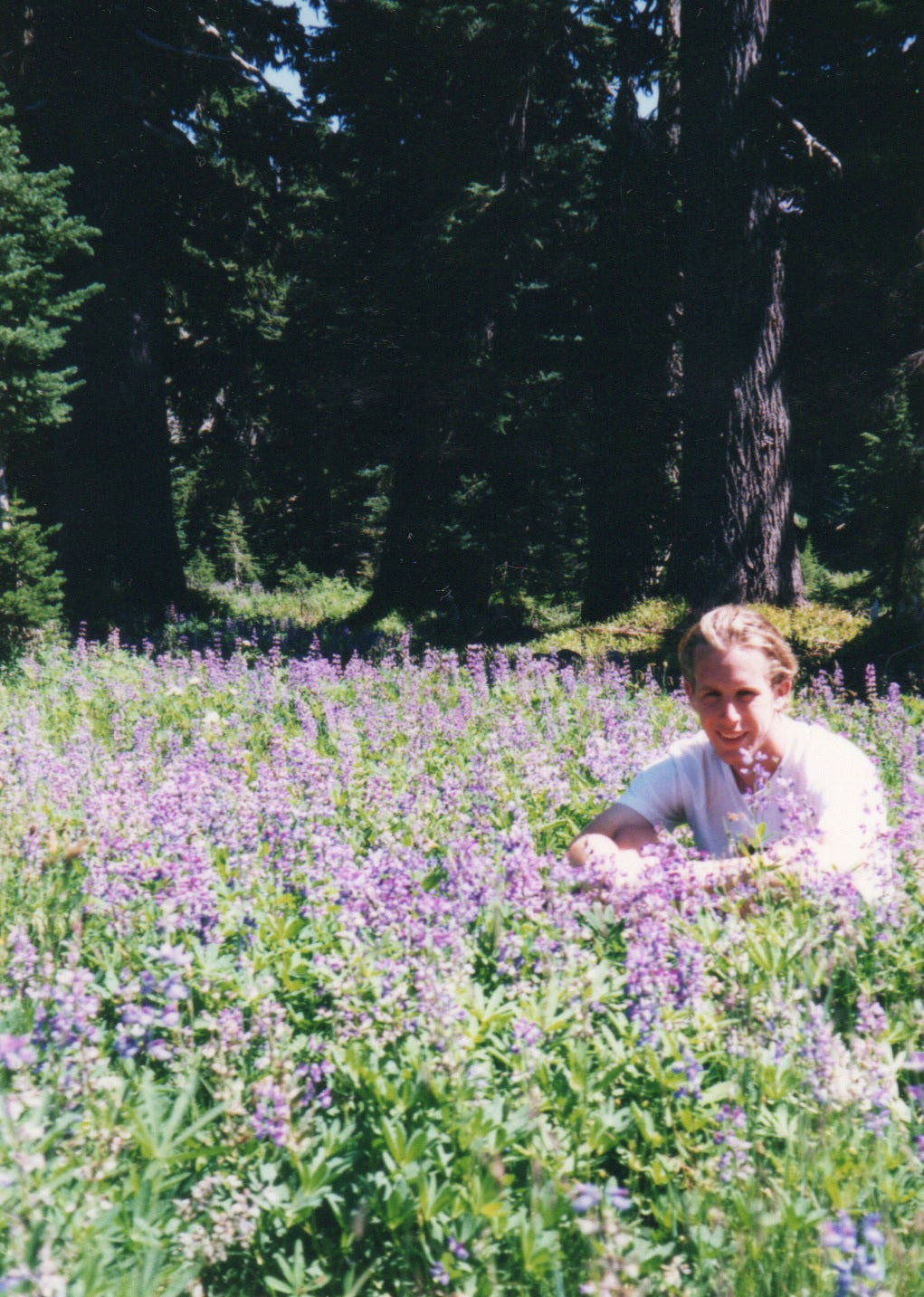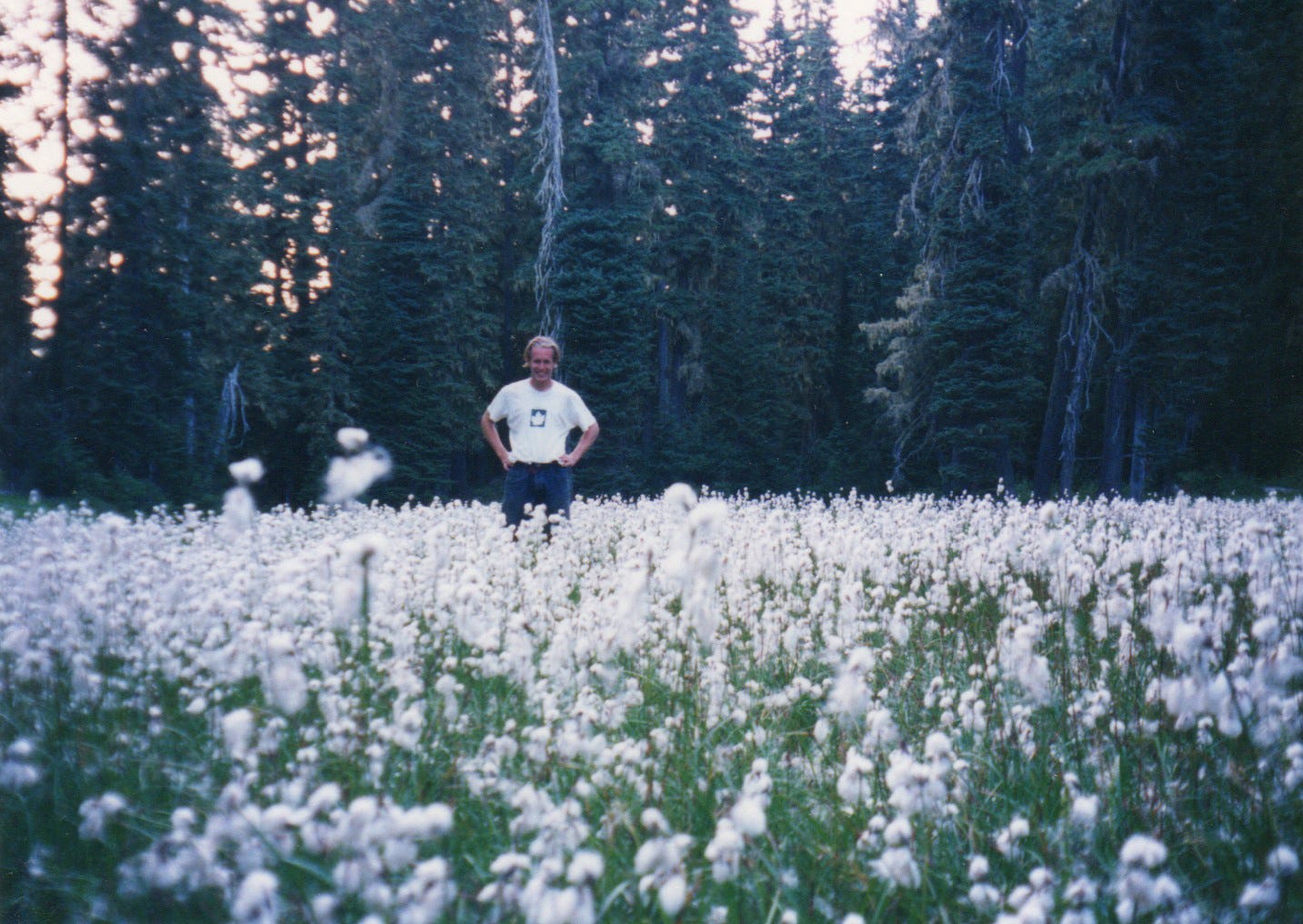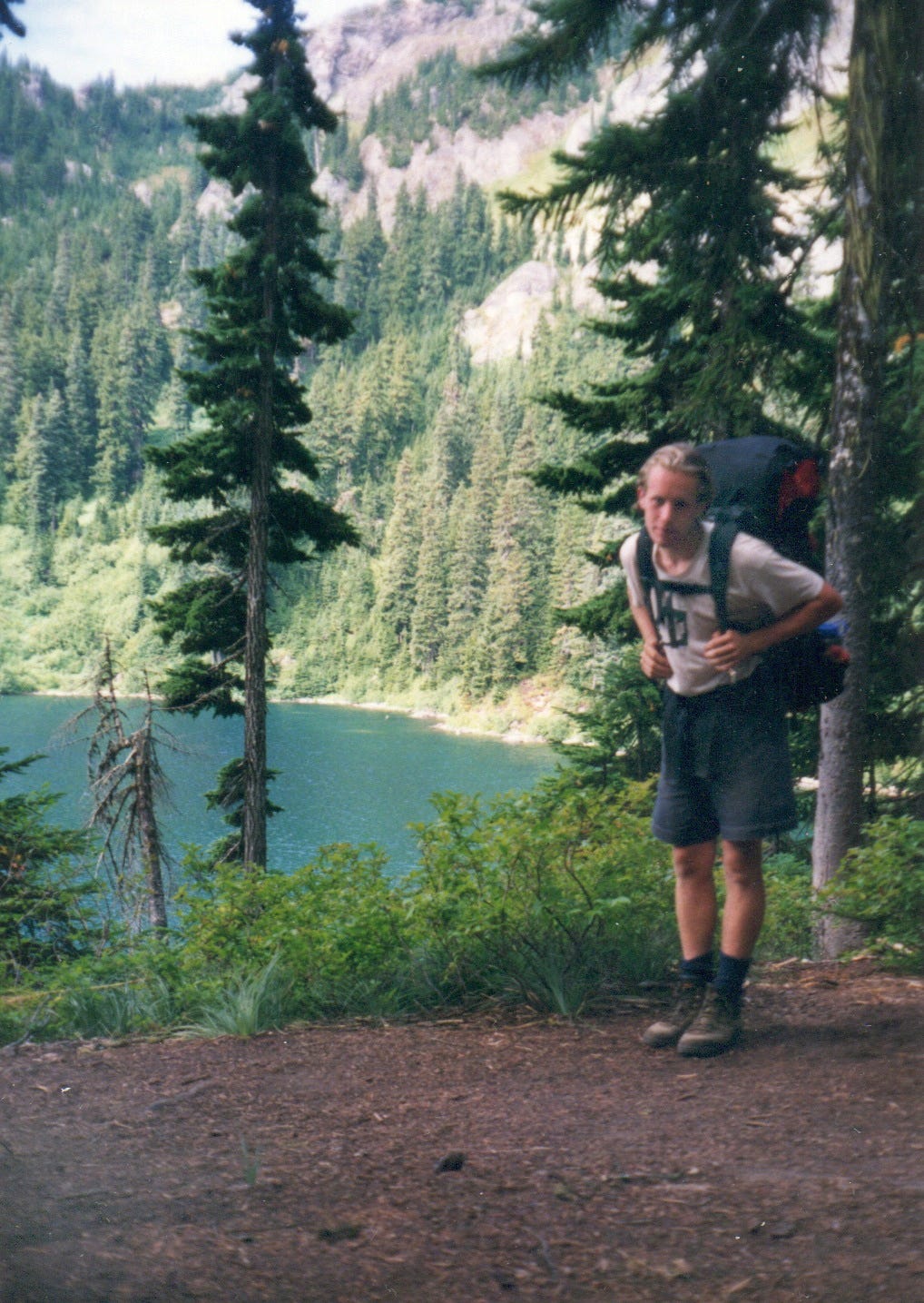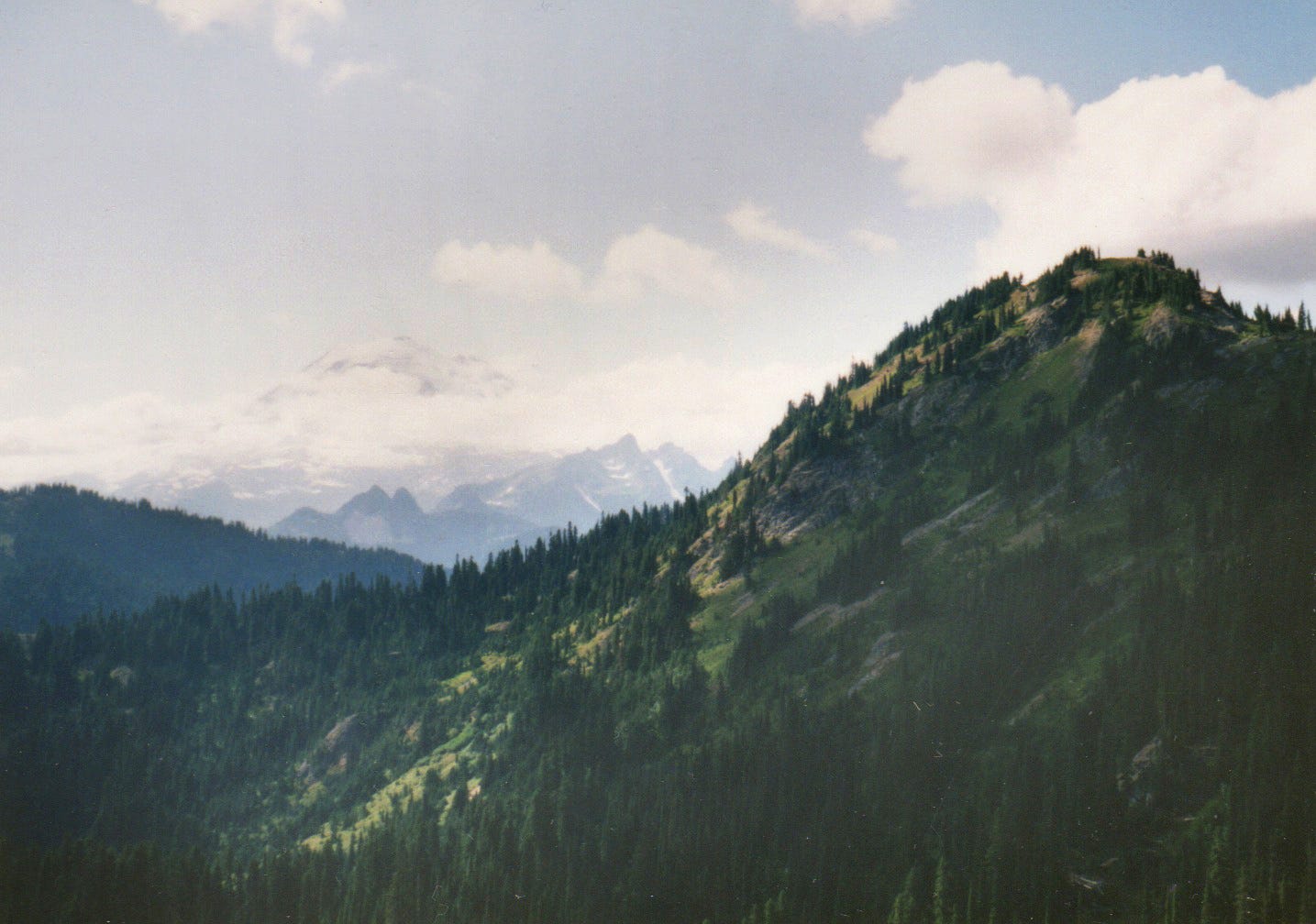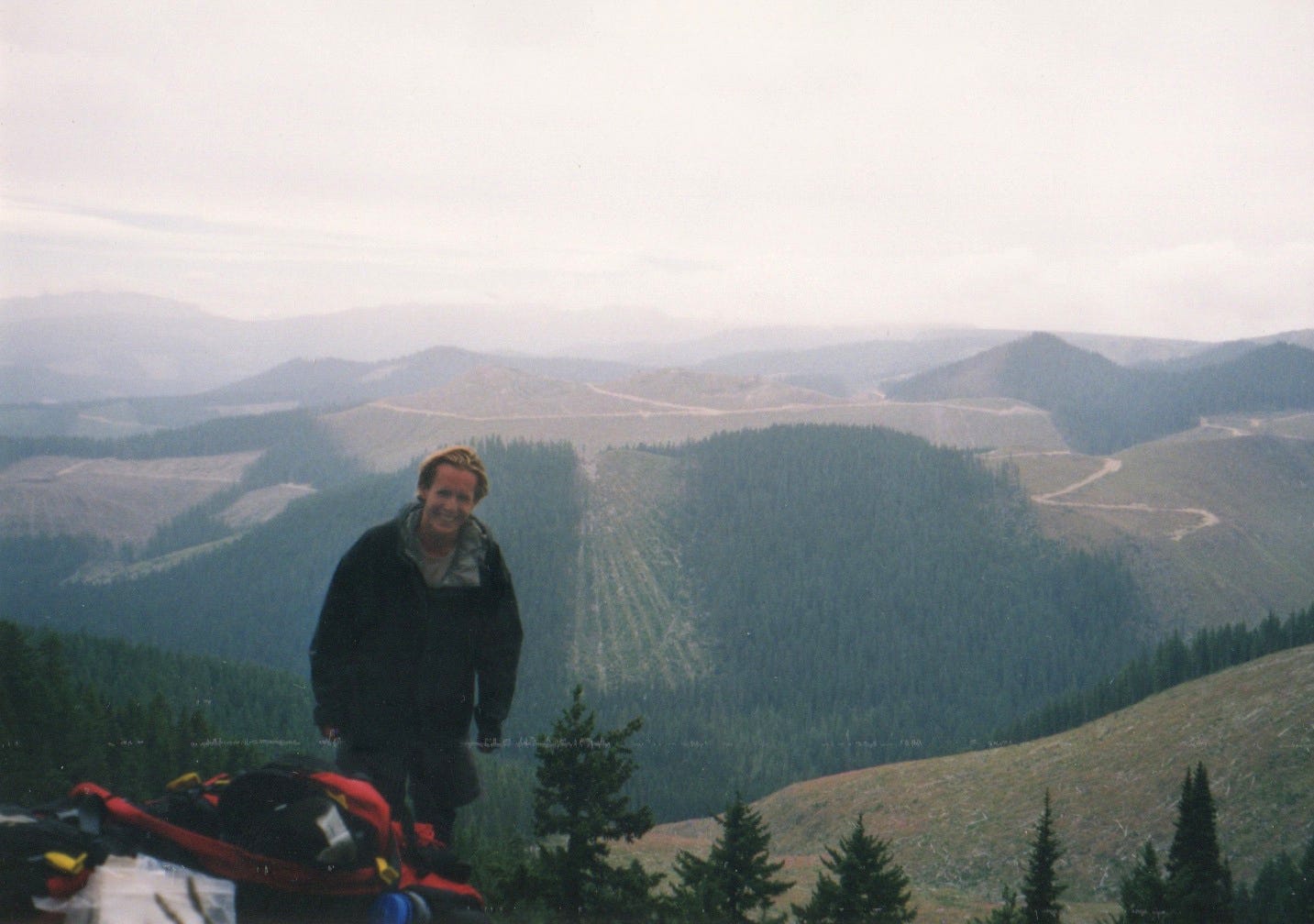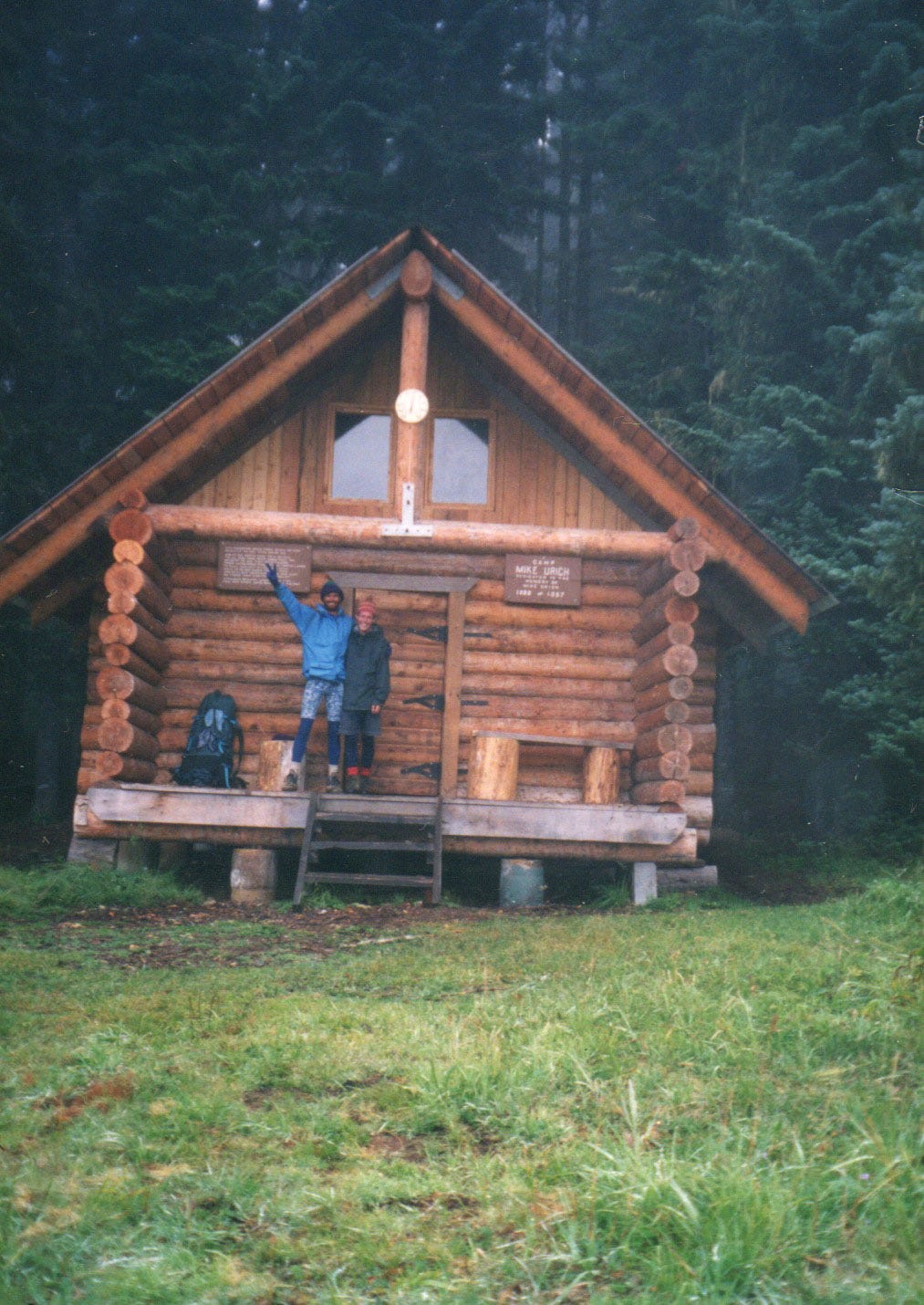The Tread of My Soul (Part 2)
Coming of Age on the Pacific Crest Trail, 30 Years Later
This is Part 2 of The Tread of My Soul, a travelogue/memoir I wrote in 1994. Read: Part 1, Part 2, Part 3, Part 4. Or find the eBook at Apple Books or Amazon Kindle Store.
Day 8.
Walked fifteen miles.
Four of them with a young man named Ryan.
One with his companion Tony.
Passed several lakes.
Entered Goat Rocks Wilderness. Ate berries.
Saw eight or so people.
I am alone here on a rock, loafed against it, complacent. The clouds above are a torpid procession of downy pillows. The water pans out before me; placid, yet dimpled like hammered copper leaf. The water is clear and I can see the trees and stones and debris that have found their repose on the lake bottom. One log is alone, like me, way off, nearly in the center of the deep jade abyss. I feel a communion between that log and I, as if the lake existed only for that log to give it a center. This log is a mystery to me. And already...
Solitude. What do I stand to gain in being by myself?
It is better to conquer yourself
Than to win a thousand battles.
-Dhammapada; The Sayings of the Buddha
And already I know...I stand to gain myself; that I may be able to say, "I own this. I’ve exhausted and renewed this. I feel joy. I feel pain. I feel mystery. I feel everything.
And already I know I must...
To see myself—not like Narcissus—but to see judiciously.
See yourself in others.
Then whom can you hurt?
What harm can you do?
- Dhammapada; The Sayings of the Buddha
In all people I see myself, none more and not one a barleycorn less,
And the good or bad I say of myself I say of them.
- Walt Whitman, Song of Myself
In solitude I prepare myself.
Very early in the morning Jesus got up, left the house and went off to a solitary place, where he prayed.
- Mark 1:35
I prepare myself for however I can hope to benefit everything outside of myself.
And already I know I must touch the submerged log!
All at once new, trembling, how he was caught up and entangled in the spreading tendrils of inner event already twined into patterns, into strangling undergrowth, prowling bestial shapes. How he submitted—. Loved.
Loved his interior world, his interior wilderness,
That primal forest inside him where among decayed tree trunks...
I strip off my clothes and dash into the water, my feet sinking in the slimy sediments beneath the shore. The water gives me an electrifying embrace. I breathe quickly, kicking and pulling my body through the water until I see I am above it. With one resolute inhale I dive down fast. It is deeper than I had judged. I pull through the water until it comes into focus: a splintered, gaunt length of wood. I touch it.
...where among decayed tree trunks his heart stood, light green. Loved.
- Rainer Maria Rilke, Duino Elegies
Turning and pulling back to the surface I see the clouds from that peculiar submerged vantage point. I feel encapsulated in the water and light. I pull my body back to the surface of the water feeling an enhanced communion with this place.
• • •
Day 9.
Walked seventeen gorgeous and inspiring miles through
The Goat Rocks Wilderness,
High above glaciated valleys.
The trail was thin and precarious.
The sun was hot.
My knees and ankles were overworked.
Saw over a dozen people.
Camped in a meadow of Cotton grass.
If solitude is one, what is zero? Nothing? What is nothing? If you eat a whole pie, are you left with nothing? No. The pie is merely different—broken down, reconstituted in your cells: carbohydrates, sugars, and so on. I understand this as The Law of Conservation of Mass and Energy. You cannot achieve "nothing" in the physical universe; but we have zero, the enigma of mathematical language—yet a necessity.
We make a vessel from a lump of clay.
It is the empty space within the vessel, which makes it useful.
- Lao Tzu, Tao Teh Ching
What is nothing? The question is a contradiction. Meaningless. Yet "something” must have an opposite so we are left with: "nothing."
Everywhere around me is something. I am on a stone and below me the hillside falls to an escarpment and below that, on a shelf, is a lake, and below that I cannot see, but guess beneath the cliff is a grove of trees, beneath the trees is soil, beneath the soil is water, and beneath the water is rock. Above me, I see a hawk, soaring. I can hold a thin blade of grass at arm's length and it will cover that creature from my sight. A Bellflower is a periwinkle blur quivering in the periphery of my vision. Expansive is not the word I’m looking for. STUFF ALL OVER IN A BIG, BIG EXPANSE. I am dumbfounded by the observable, delighted by the discernable.
Back to nothing: The closest I've ever come to experiencing nothing was in a cave. We walked nearly a mile in with lamps then shut them off, remaining still and silent. Even then, I could feel the temperature of the air and hear the blood in my ear.
If you have a pile of three stones and you take away three you need zero—but there they are: three stones elsewhere, likely not in a pile. Physics uses the absolute symbol of zero in a language to describe the world with precision. Zero does not exist, yet it must.
If God did not exist, he would need to be invented.
- Voltaire
What is God? Shall I pretend to really know? Do I dare ask the question, or will a deluge of answers follow, serving only to confuse me? How can zero be a universal absolute and God a wild multiplicity of things?
Back to nothing: The Apostle Paul likens the believer's body to a jar of clay. Where it was once empty, with faith it is filled with--in the words of the apostle—a treasure: God.
We make a vessel from a lump of clay.
It is the empty space within the vessel which makes it useful.
- Lao Tzu, Tao Teh Ching
Both zero and God, it seems, are useful. They are constructs of utility; they give order to the world. Why am I here? What is left of two minus two? You ask, is God (GOD ALMIGHTY) merely a construct? My reply is this. That which is not visible cannot be made to disappear. Therefore, God is enduring. That which begins a thought cannot be unthought. Therefore, God is eternal. That which is useful will be used. Therefore, God is at work. And finally, God is at least this, arguably more.
I have only two more thoughts: 1) Zero will endure. God will endure. Humanity may be closer to abandoning God but I count either event well beyond a time horizon I can conceptualize. 2) Because of this dependency on both God and zero, members of both camps, religion and science, are wise to not squander the construct of language by criticizing each other.
• • •
Day 10.
Walked twelve miles to emerge at White Pass.
Swam in Shoe Lake.
Took a shower at gas station. Set new supplies in order.
Had french fries, soup and apple pie at restaurant.
Camped near road at Leech Lake.
Elk swam and bugled riotously at dawn.
I remember some amiable folks, a couple, came over to my home after I was baptized. They brought me a whole bucket of stuff: an old 5-gallon ice cream container decorated nicely with wallpaper. The contents of which I don’t recall apart from two things: a gold-colored Adult Bible with the words "Good News" printed on the cover to replace my illustrated children's version, and a certificate of baptism. There were more probably non-ostensibly pious things but I forget them. The bucket stayed in my closet for years and all sorts of things migrated through there.
I remember thinking it important to read the Bible thereafter. I took an old plastic end table we had, presumably in storage, dismantled its legs and used it for a special Bible study desk that could be pulled out from under my bed and pushed back in with the greatest of ease. I remember thinking this was a satisfactory system.
About then was when the fighting started. To this day I am not entirely aware of the reasons for those fights other than my father's fidelity was crumbling. It did not take much to see that the union of my parents was breaking up.
One night in late August of that summer—-for I remember the setting sun and the quality of the light that filtered indoors—the tone and manner of the fight placed in me an imminent fear.
I went to my Bible and looked up the word 'divorce' in the index, underlined it, and presented it to my parents laying it at their feet with these bold words, "If I can't help maybe God can!"
I left it there and retreated but I could not hide from the hush and the cries, no corner of the house would cradle or console me.
• • •
Day 11.
Hiked fifteen miles.
Saw many Boy Scouts. Three Troops worth.
Image: Boy Scout inhaling Easy Cheese from pressurized can blissfully.
Wrote by lake and touched log at the bottom of it.
Camped alone (surprisingly) at Bumping Creek. Easy walking.
Well below me, in the valley, I see two cabins as I hike. The clouds are thick and imposing. My nose stings from the cold and I fumble to write with my mittens. For the first time on the trip I really want to be sheltered. The wind strengthens and I decide to pack up and leave.
I have fortuitously come to a Forest Service cabin. I am writing on the covered porch.
I thus found that the student who wishes for shelter can obtain one for a lifetime at an expense no greater than the rent he now pays annually.
- Henry David Thoreau, Walden
On the trail my shelter weighs 4.4 pounds. My bed weighs 2. Thus, with 6.4 pounds on my back I could probably live sheltered happily for two thirds of the year. No rent, mortgage, or utilities. Admittedly, the cost and the mass (which I think should be considered in modern architecture) are both far less than the expense and bulk of a house, a flat, whatever.
In choosing a dwelling I invariably choose my lifestyle. Architects are long-term therapists whether they realize it or not. I ask myself what would my soul choose? A furnished house with all the latest modern conveniences? But, then, can’t modern conveniences become shackles? They have a way of tying you down. A refrigerator is heavy. A house can be a jail of luxury:
I intend to build me a house which will surpass any on the main street in Concord in grandeur and luxury as soon as it pleases me as much
and will cost no more than my present one.
I have a tight shingled and plastered house ten feet wide by fifteen feet long...
- Henry David Thoreau, Walden
To my left, on the porch of this cabin is another wayfarer, Karl. Together we share a view of meadow, trees, and mist. Earlier we gathered wood together and acquainted ourselves with one another. The wood now crackles inside the wood stove in this cabin. Our supper slowly cooks atop. I am but a transient here and that is the design. Goodbyes are necessary for hellos. I have restless feet and a passion for knowledge gained by travel.
I think this will one day fade like a season in my life, with surprise or expectation, and I will want to settle down.
Do you know what I would like to do then? I want to build my own house. Contriving shelter is secondary in instinct only to eating, it seems. And yet so many people dismiss their own ability to do this.
I would like to know that feeling just once: to know the joy of building a house that is sustainable and benign. It would be something to dedicate my hands and mind to. Do I really need employment so I can in turn employ someone else to build a house for me?
• • •
Day 12.
Hiked up and struck an easy flat. Perched myself on a rock and thought and wrote for hours.
Many people passed and remarked how lovely a day it was.
Turned cold that evening.
I heard a child crying in the middle of the night at an adjacent campsite on Dewey Lake.
I see a wild flower called a Skyrocket: an intensely red, small, trumpet-shaped flower. I think this name is apt. They do look like pyrotechnics, as they tend to array themselves in an explosive and forlorn manner.
If most insects cannot see the color red how did this flower evolve? How is it pollinated?
How has God evolved though I, as Thoreau termed, "the human insect", cannot see Him. And yet he is a dazzling red display to some?
Skyrockets.
Frederick Buechner asks the question: What do you suppose would happen if God decided to reveal Himself by writing with stars and celestial bodies “I AM GOD” in the night sky? Furthermore, what if He would add some grand cosmic music to accompany the display to leave no doubt. What do you suppose would happen?
To this he answers: eventually someone will ask, "So what?"
Not that you could endure
God's voice-far from it.
But listen to the voice of the wind
And the ceaseless message
That forms itself out of silence
-Rainer Maria Rilke, Duino Elegies
Skyrockets.
I used to think in heaven there would be a different set of colors that I couldn't even imagine; a whole new set of Crayola crayons from God's fount of invention!
I don’t know if the bees will get to see red in heaven or not. For now, the hummingbirds, most likely, keep the flowers in bloom for us.
• • •
Day 13.
Hiked fifteen miles.
Came upon many horses on the trail. All of them amiable.
Was cold. Too Cold to stop and write.
The mist made the ridge landscape surreal. Too slanted.
Alone.
Went to sleep early.
I am on an andesite rock outcropping cross-legged. From this vantage point I see a modified, some would say, ravaged landscape. With my eye I can count at least 28 distinct clear-cut patches. On the horizon water vapor rises from the fir canopy into the broad sky. I can see the radiating marks from what I presume was a yarder--a tow line--anchored atop the hill. The marks cascade like spokes. I can hear trucks carrying two loads of rock each groaning up and down these hills. I hear the blast of a horn, surely a universal signal in logging practices.
Here are geometric and angular shapes imposed on the rolling hillsides. From above, I reason, it would look like a quilt.
Here, trees both rise and fall. This landscape suggests to me that they are falling at a rate faster than they can rise.
With dispassionate eye He sees everywhere
The falling and the uprising
- Dhammapada, The Sayings of the Buddha
Everyone that I have encountered on the trail has a passion for forestlands and a huge swath of trees taken from the hills is upsetting, if not an affront to them. I have taken note of two reactionary items in print: First a small sticker posted on trail markers with a picture of a stump and the modified acronym PCT—"Pacific Clear-cut Traverse"; Second, a card with Dr. Seuss's Lorax character pictured and his traditional caveat, "I am the Lorax and I speak for the trees.”
How would you respond? Have you ever seen a landscape with at least 28 clear-cuts?
There is a respected activist organization going by the name of Lighthawk that flies congressmen and forest influential sorts over such landscapes. This is a good practice, I think. The landscape can speak for itself. It bears no propaganda. I wonder why those people put those stickers and leaflets up. I could see the stumps just as well as they.
I saw droves of Boy Scouts a few days ago on 50-mile hikes. I saw them on the pristine sections of the trail, that is. If someone is going to require such a walk for a young scout to advance in his understanding, why not route part of trek through where the forest is being managed? Why not give a merit badge for spending time among the stumps?
I look and see the falling and the rising. I am reminded of our mammalian cousin the beaver who is second only to humans in terms impacting the environment. We have made a dramatic step. I say so dispassionately. The landscape is its own passion.
• • •
Day 14.
Walked ten miles.
Walked and slipped in the early morning hours to Camp Urich—a new shelter with a wood stove, loft and windows.
There I met Karl, whom I have since enjoyed.
We gathered wood, exchanged words and communed over dinner.
I was embarrassed about that line I drew beneath the word divorce in the index of my Bible. Not wanting to rip a page out of this sacred text—even from the index—I concealed the blemish with a fat black line covering the word neatly.
This troubled me for a subsequent handful of days in that it was the symbol to epitomize my feelings: I could not conceal my parents turning from each other.
My mother, as a child, took black crayon to the undersides of my grandmother's furniture and made cathartic marks of anger to express her displeasure.
The mark in my Bible originally meant to conceal my feelings transformed itself into a black mark on the underside of God's furniture. I prayed in earnest that God would keep our family together. There were two possibilities for His response: Either (1) God chose to allow this to happen for some dubious good end:
[We] rejoice in our sufferings because we know that suffering produces perseverance; perseverance, character; and character, hope.
- Paul, Romans 5:3
Or, (2) God didn't hear my prayer because He didn't exist.
Although in those years I never set upon a conclusion, I allowed both possibilities a seat in my head, and my heart followed in course. I have since been living the examined life.
My parent’s divorce coupled with my maturing intellect generated several questions regarding God:
1) Why do people worldwide who don't take Jesus for their savior go to hell? And what of those who have never heard his name?
2) If God is not a necessity for living on this planet—for atheists look healthy enough—why do we bother with Him?
3) If God's love is unconditional and the design behind Christ was to give us eternal life, why then is this gift conditional? The condition being one must believe he is God in The Flesh, a strange self-sacrifice that secures our salvation.
4) Why does the Bible not mention dinosaurs? (Time problems. Creation story problems.)
Now, admittedly this set of questions is not original. These rational questions come to believers as surely as the seasons.
I do believe we have seasons for our soul and I should liken his one to fall—when the world transforms itself into something austere.
By virtue of separation of church and state in school, and a less frequent attendance at church (not that it would have helped) I had no forum to illuminate the depths of these questions, much less begin to answer them. I just collected them as they occurred to me and seldom found enlightenment. Such was the condition of my soul for years. I maintained both a faith in God and a warehouse for questions.
Read: Part 1, Part 2, Part 3, Part 4. Or find the eBook at Apple Books or Amazon Kindle Store.


